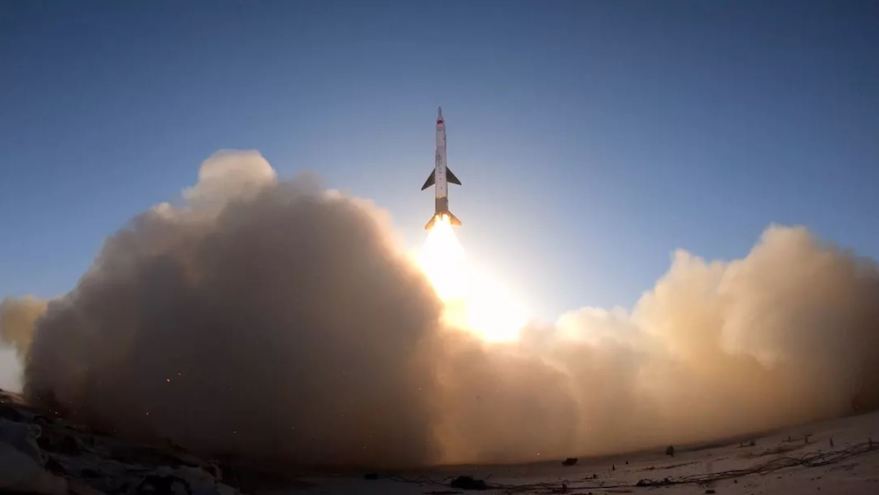HELSINKI — Chinese firm Space Transportation raised more than $46.3 million for its hypersonic spaceplane plans in a new funding round announced Monday.
Space Transportation, full name Beijing Lingkong Tianxing Technology Co., Ltd., completed its third round of financing, securing more than 300 million yuan, according to a press release.
The funds will be used for development of commercial suborbital and hypersonic vehicles, with Space Transportation setting out a 10-year roadmap for development of its reusable vehicles. The company plans various large-scale technology verification flights through 2022 and aims for a first flight of a suborbital space tourism vehicle prototype in 2023, followed by a first crewed test in 2025.
A first “global” hypersonic vehicle flight is slated for 2028, with a full-scale global hypersonic vehicle flight will take place in 2030.
The most notable activity from Space Transportation’s so far has been an April 2019 test flight of a 3,700-kilogram technology demonstrator named Jiageng-1. The test was carried out in cooperation with Xiamen University and took place just months after its founding in August 2018.
The company also test fired its Lingkong-1 engine in November 2020 and tested landing gear earlier this year, but likely faces numerous technological challenges in developing its vehicles. New renders released with the funding announcement differ from previous depictions of its “Tianxing” spaceplane series.
Space Transportation describes itself as the only Chinese high-tech enterprise engaged in the development and application of commercial hypersonic flight products, and claims hypersonic flight technology to be a “new commanding height” of aerospace technology in the 21st century and as having “great commercial value”.
Space Transportation’s vision is however apparently one of a number of Chinese hypersonic spaceplane plans.
The China Aerospace Science and Technology Corp. (CASC), a giant state-owned enterprise and the country’s main space contractor, has carried out two tests since September 2020 related to “reusable experimental spacecraft”, while sister company CASIC is also developing a spaceplane, named Tengyun. Chinese commercial firm iSpace has also expressed plans to launch a spaceplane alongside developing its Hyperbola rocket series.
Virgin Galactic last month flew its SpaceShipTwo vehicle to the edge of space following nearly 17 years of work.
Chinese commercial space funding
The round was led by Matrix Partners China and major state capital investor Shanghai Guosheng Group. Matrix has made a number of large investments in Chinese commercial space companies, including iSpace, new launch startup Oriental Space, remote sensing satellite company Changguang Satellite, Landspace and Spacety.
New investors also joined the round, with existing shareholders Source Code Capital, Volcanics Venture and more increasing their investment.
The new funding was one of a number of major funding rounds secured so far this year by Chinese private and commercial space firms. Many of these have been concentrated in launch-related firms and satellite manufacturers.
In January reusable methane engine maker Jiuzhou Yunjian secured funding after a long silence. Commsat, a private satellite technology company, received hundreds of million yuan in strategic funding in February.
Qiansheng Exploration Tech, a commercial microsatellite developer and operator raised $15 million-plus in series A funding in March. Another methane rocket engine maker, Aerospace Propulsion, also known as Rocket Pow, raised $15.2 million in April for development of the Canglong-1 engine.
CAS Space, a spinoff from the state’s Chinese Academy of Sciences, raised $31 million in funding in May as it prepares for launch of the ZK-1A solid rocket. Oriental Space emerged in June, as the newcomer launch startup raised $62 million in angel round funding. Huzhou-based Rocket Pi, another recent addition to the crowded Chinese commercial launch sector with ambitious plans for a space lab, raised tens of millions of yuan in July.
This activity was followed by reusable launch vehicle Space Pioneer raising at least 30 million of dollars and Yunyao Yuhan, specialized in space weather data, securing tens of millions of yuan in late July.
Funding in 2021 has not appeared to match the size of largest rounds from 2020, including remote sensing firm Changguang Satellite ($375 million), launch companies Landspace ($175 million), iSpace ($173 million) and Galactic Energy ($21.5 million), as well as satellite communications startups Commsat ($38 million) and Galaxy Space. Companies are however continuing to attract funding despite the impacts of the COVID pandemic, and perhaps with reassurance from new national policies.
